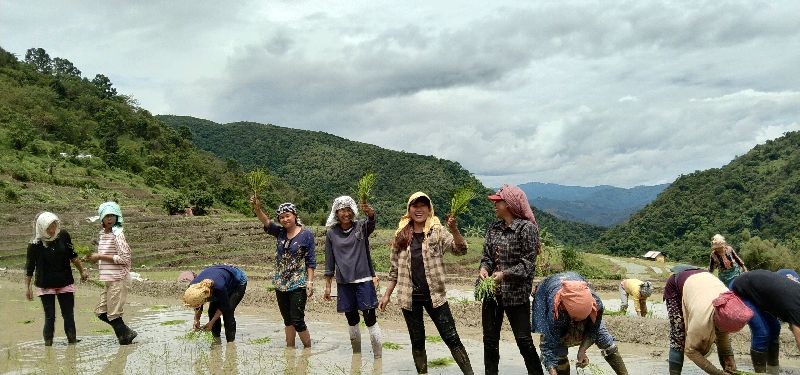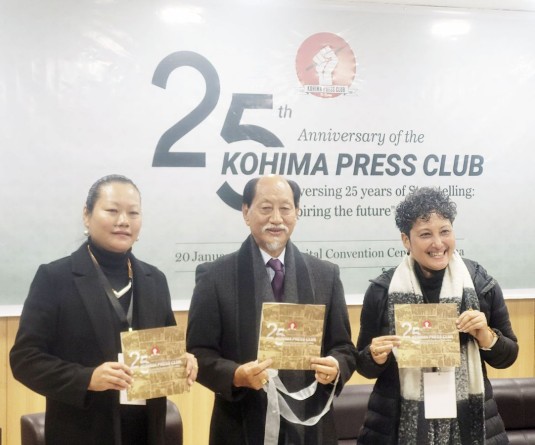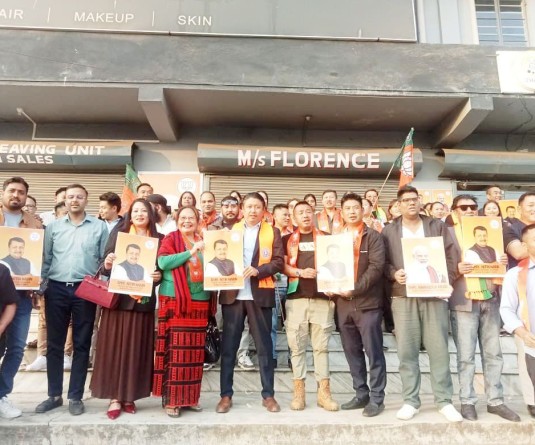Students and young women from neighbouring villages sowing paddy saplings at Müdütsügho village. With classes suspended, students have been working as part-time farm hands to generate incomes and help their families. (Morung Photo)

Kanili Kiho
Chisholimi | September 1
When the nationwide lockdowns to curb the global pandemic were enforced earlier this year, many of the students found themselves with more time on their hands than usual.
Many of them got creative, taking advantage of their free time and picking up new hobbies and habits that have enabled them to create economic opportunities.
For this two part series, The Morung Express spoke to several youths in Nagaland's Zunheboto district many of who had to return home from their places of study as lockdowns disrupted their ‘formal education.’
Caricature and sketching
20-year old Ibeto V Swu, a promising caricaturist has earned roughly 50k during this lockdown.
Ibeto ‘discovered’ caricature recently and has since been spending most of his time sketching and creating art that he uploads on his Instagram page, @ibeto_v_swu.
"I've never been more interested in art than right now," Swu, who hails from Kichilimi village under Pughoboto sub-division, shared. He has also been receiving orders from Nagaland and outside the state as well through this page.
The young student has also started a long-term business with two of his friends—Razu Tacu and Allisen Solo called Airtouch Enterprise/Design, a clothing line that prints their original designs.
Swu, whose painting was also exhibited during the 2019 Hornbill International Festival, is pursuing a Bachelor's Degree of Arts (BA) from Kohima College and is now in the 3rd semester.
Another college lad from Japfu Christian College, Mulato B Yepthomi has also turned to art to help his parents. Hailing from Khetoi village, Mulato has been selling his sketches to contribute to the family’s income.
YouTube and the art of homemade food
Taking cues from tutorials on YouTube, Topuli Awomi from Zunheboto has been taking orders for cakes, cupcakes and pizzas from the comfort of her home in South Point West colony.
A Bachelor of Divinity (BD) student from Serampore College, Kolkata, Topuli began baking in July as a way to earn some pocket money, doing what she loves.
“I am no baking expert, but I follow instructions thoroughly and do my best to provide quality food,” she shared.
"People shouldn't hide their talents. We never know what we are capable of," she added.
Similarly, a brother-sister duo from Alahuto colony, Zunheboto tried their hands on cooking and baking during this lockdown.
The idea hit home, when in the month of June, one of her friends came selling ‘chowmein.’ Abotoli realized she could also generate income by pursuing her interests in cooking and approached her younger brother Mughapu, who readily agreed to help her.
The duo has since been taking orders from home and making home deliveries around Zunheboto, making a substantial profit.
Thrilled with the outcome, Abotoli, a postgraduate student whose training programme in Medziphema, was put on hold because of the lockdown, thanked their parents and relatives for the support.
The key to a fruitful business, according to the duo is “strong determination, hard work, perseverance, creativity and innovation, and a healthy dose of positive encouragement from people.”
Back to basics
Lashikali Swu, a high school student from Chisholimi village, Pughoboto has taken a different route and ‘gone back to the basics.’
Apart from helping out in the family's farm, Swu, who studies in Dimapur, began working in paddy fields around the village for a daily wage of Rs 200—an activity that used to be commonplace among students in the not so distant past.
The daily wage rate in the village has now been increased to Rs 250.
She termed it as “a great experience to learn the basics of self-sustenance,” especially during these unprecedented times.
Another group of five young boys also engaged themselves in similar daily wage work and earned Rs 4, 000 in the month of May and June. Katoka, who studies in Shillong said they celebrated Tuluni festival (Sümi's premier festival) on July 8 with family and friends with the earning.
College goers, Kivika and Khekaho from Natsumi village, also under Pughoboto opened a barber shop during the lockdown. Charging Rs 30 per cut, on a good day, the siblings earn up to Rs 600. They have also been going on duty in Pughoboto town, cutting hair and providing grooming servces for men in the area.
This is the first of a two-part series.





